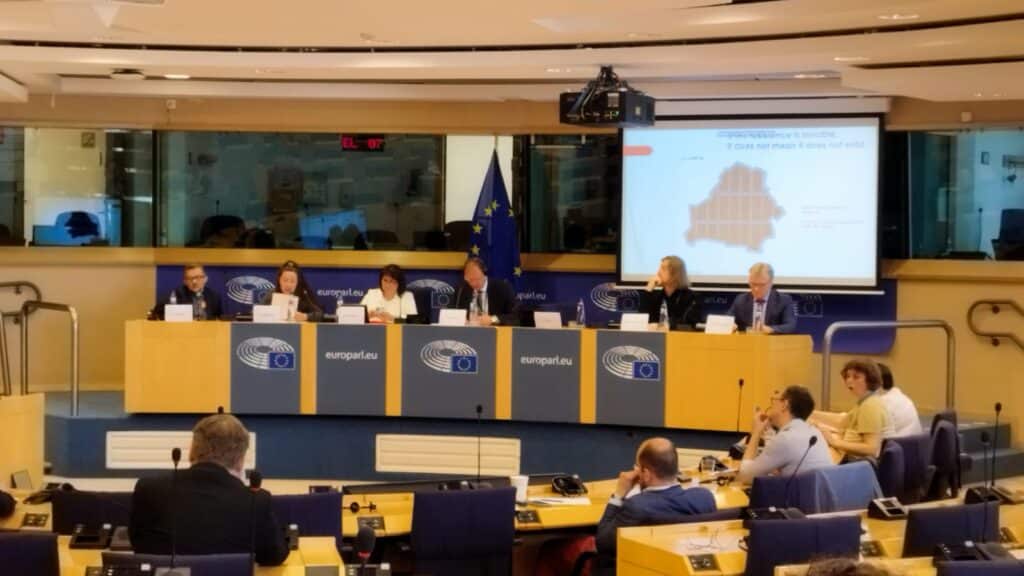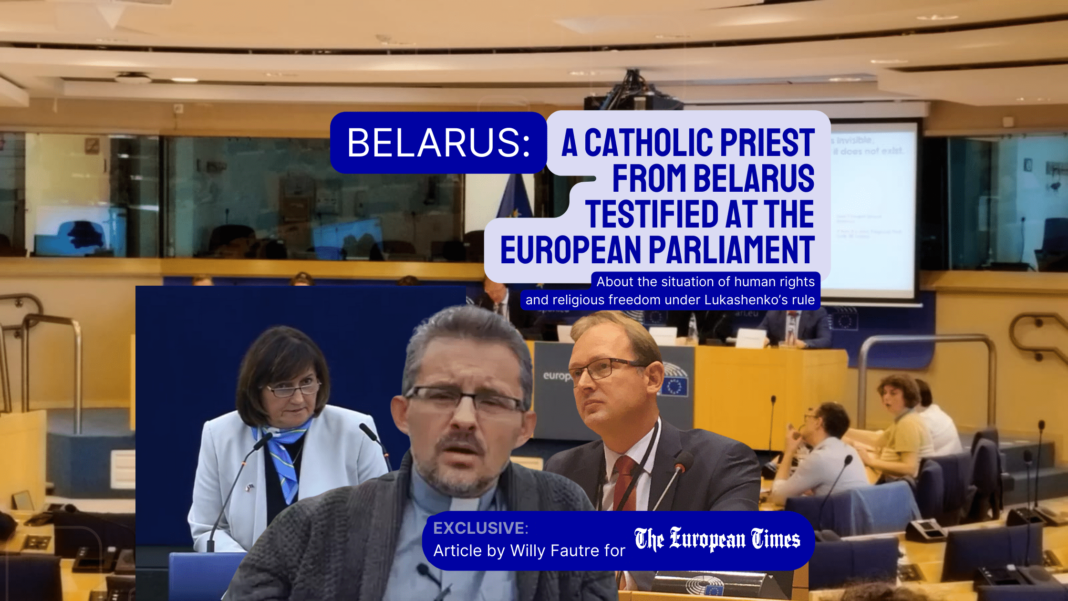European Parliament / Belarus // On 31 May, MEPs Bert-Jan Ruissen and Michaela Sojdrova organized an event at the European Parliament about religious freedom in Belarus titled “Help the Christians in Belarus.”
One of the speakers was Vyacheslav Barok, a Roman Catholic priest who had to leave the country in 2022 and is now living in Poland. Through his personal experience, he testified about the situation of human rights and religious freedom under Lukashenko’s rule.
Being a priest in Belarus: from the Soviet Union to the 2020s
Vyacheslav Barok has been a priest for 23 years. Most of the time he lived in Belarus. He built a church there, reconstructed and repaired several more religious buildings. He was actively engaged in evangelisation and for over 10 years, he organised trips to pilgrimage places such as Velegrad, Lourdes, Fatima or Santiago de Compostela.

After the collapse of the Soviet Union, there was a brief sunshine period when religious life could be revived but still, the Church remained an object of discrimination, the priest said.
Until today, Belarus is the only country in the post-Soviet space, where the Office of the Commissioner for Religious Affairs has survived. This state institution was created at the time of the USSR for controlling and limiting the rights of believers.
“Even today, the state still gives the Commissioner the authority over all religious organisations as in the Communist period. It is within his or her competence to decide who is allowed to build churches, to pray in them and how,” Barok added.
Back in 2018, the same state-authorised Commissioner pressed his bishop to censor him in his homelies and to forbid him from speaking and writing in social media about social injustice in the country. Such pressure took place despite the Constitution of the Republic of Belarus providing for the right to freedom of thought and expression in its Article 33.
“Still, everything that happened before the autumn of 2020 with the rigged presidential re-election of Lukashenko was only a prelude to the open and comprehensive persecution of any manifestation of freedom of thought and the suppression of opinions alternative to ‘ideologically ‘sound ones’,” Barok stressed. Consequently, there were dozens of imprisoned priests and thousands of political prisoners.
Lukashenko’s open persecution of priest Vyacheslav Barok
In January 2020, Barok started producing a YouTube channel on which he shared his views on Christian matters in the modern world and discussed the social teaching of the Church.
His activities on social media drew the attention of law enforcement agencies. From November 2020 to May 2021, they monitored the content of his YouTube videos looking for some of his statements that could be criminalized. They ordered a linguistic examination of ten of his videos but they failed to find any crime on the basis of which he could be prosecuted. However, as a preventive measure, he was sentenced to ten days of administrative arrest in December 2020.
His requests for the administrative process and the court proceedings to take place in Belarusian, one of the two official languages alongside Russian, were rejected. The Belarusian language is unacceptable in Belarusian courts today, Barok said.
During the year 2021, law enforcement agencies staff called him occasionally and asked him more than once if he was still in Belarus. They were hereby hinting that he should leave the country.
As he neither wanted to limit his freedom of thought and expression nor planned to leave Belarus, an administrative case was again opened against him on trumped-up charges in July 2022. The prosecutor’s office started to confiscate all his office equipment and phones, most probably to try to deprive him of his means of producing videos for YouTube. At the same time, he also received an official warning from the regional prosecutor’s office. He then had to leave Belarus. Otherwise, he would not have been able to continue his ministry. He left for Poland from where he went on preaching and speaking on YouTube and other social media.
However, Lukashenko‘s regime did not forget him. Four of his YouTube videos were added to its list of extremist materials.
Additionally, to put pressure on him, representatives of law enforcement agencies visited his father several times in November and December 2022 and questioned him as a witness in the criminal case.
“Long before 2020, I predicted the social and political crisis in the country to get deeper. I argued that without rethinking the atrocities committed under communist rule, state-sponsored terror would inevitably reoccur,” Barok stressed.
A call and a message to the EU
And Barok went on saying: “Today, being in the European Parliament, I want to thank you for your interest in the difficult situation in Belarus. Nobel Peace Prize laureate in 2022, Aleś Bialacki, who is Catholic and a Belarusian pro-democracy activist, called the current situation a ‘civil war’. He used this phrase in his final speech at the court and called on the authorities to put an end to it.”
On 3 March 2023, Ales Bialacki was sentenced to 10 years in prison on fabricated charges. He is a founding member of Viasna, a human rights organization, and the Belarusian Popular Front, serving as leader of the latter from 1996 to 1999. He is also a member of the Coordination Council of the Belarusian opposition.
Barok added:
“The civil war waged by the criminal regime against its own people is taking place in the context of the increasingly pervasive Russian occupation. Of course, under such external conditions, there is very little hope for freedom of religion. Today, if religious organisations still have the right to exist openly, it is only because Lukashenko’s regime needs to instrumentalize the churches for his own political purposes.”
And Barok concluded:
“If the world ignores the Belarusian problem, or an attempt is made to base a dialogue on compromises with evil (bargaining, for example, the release of political prisoners for the lifting of sanctions), the opposition in Belarus will only grow. It inevitably will lead to a violent scenario.In order for peace to return to Belarus, it is necessary to create a situation in which all those who have committed crimes against Belarusian people will begin to answer for those crimes.And of course, the help of the whole of Europe is needed here. The responsibility for the fate of Belarus rests not only on the Belarusian people, but also on the whole of Europe.”
More about Priest Vyacheslav Barok
https://charter97.org/en/news/2021/8/14/433142/
https://charter97.org/en/news/2021/7/12/429239/
https://www.golosameriki.com/a/myhotim-vytashit-stranu-iz-yami/6001972.html









